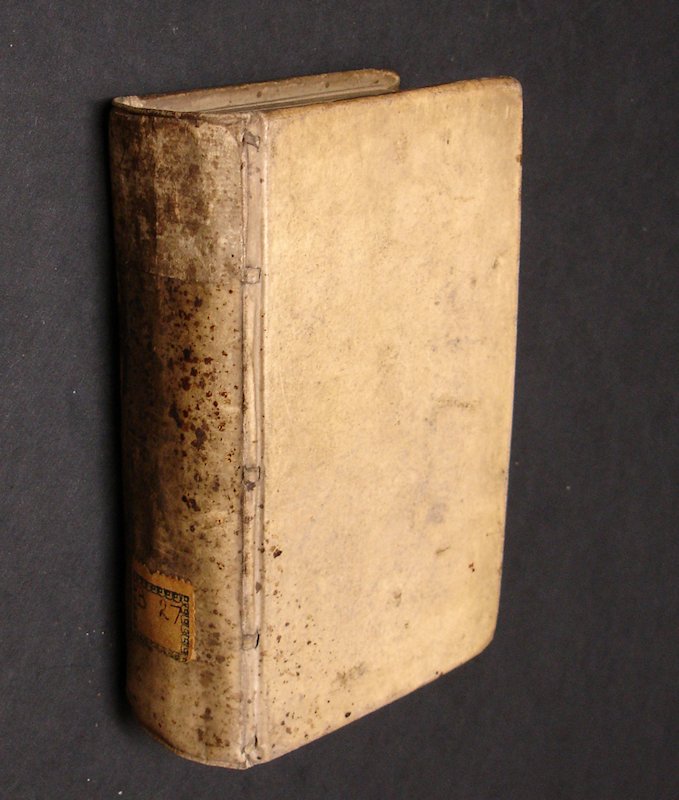FLORUS.
L. Annaei Flori Rerum Romanarum libri quatuor, annotationibus, in usum studiosae juventutis, instar commentarii illustrati, auctore Johanne Min-Ellio. Quibus accedunt exerptiones chronologicae, ad Flori Historias accommodatae; additus denique L. Ampelius ex Bibliotheca Salmasii.
Rotterdam (Roterodami), Ex officina Arnoldi Leers, 1680.
12mo. (XXIV, including frontispiece), 405; (99 index),(2 blank) p. Vellum 14 cm
Favourite school-book in the 17th century (
Ref: Schweiger 361) (
Details: 5 thongs laced through the joints. Frontispiece, depicting a victorious Dea Roma on a pedastal, flanked by a statue of Romulus and of Caesar, who symbolize the beginning and the end of this historical work. At their feet the famous twins and the she-wolf. Woodcut printer's mark on the title, its motto reads: 'Labore et Vigilantia'. It depicts a woman, Vigilantia, holding an open book in her left hand, and a oil lamp in her right. At her feet a crane. The element 'labor' is represented by a ploughing farmer in the background. Leers used 8 different versions of this mark) (
Condition: Vellum age-toned. Big inkstain on the lower board; a small shower of tiny inkstains on the back; two old and small paper library lables on the back. Name on the front flyleaf. Frontispiece printed with a worn plate. The outer edge of the frontispiece is thumbed. The paper is slightly yellowing) (
Note: This is the chief work of the Roman historian Lucius Annaeus Florus, who lived at the beginning 2nd century AD. It is an abridgement of Roman history with special reference to the wars waged up to the age of Augustus. Florus 'shows a certain literary gift, marred, however,by a strong tendency to rhetoric. His brevity often entails obscurity, though he sometimes produces a felicitous epigram. (...) As an historian he is often inaccurate in both chronology and geography, but the work as a whole achieves a limited success as a rapid sketch of Roman military history. It was a favourite school-book in the 17th century'. (OCD, 2nd ed. p. 442) Schweiger records a host of Florus editions, among which 6 by the Dutch schoolmaster Johannes Min-Ellius, ca. 1625-1670. He produced one of the many school-editions of Florus. It was first published in Rotterdam in 1670, was a success, and was repeated there in 1680 and in 1698, in Copenhagen in 1700, in London in 1706, and in Leipzig in 1734. One seldom sees an edition of Min-Ellius in good condition. He was educated at the Erasmianum at Rotterdam, and was until his death a Praeceptor at the same school. Minellius, or Min-ellius, produced several school editions of classical authors, such as Vergil, Florus, Horace, Terentius and Ovid, with ample annotations in easy Latin. At the end of the 17th and in the 18th century his editions were widely used, not only on Dutch grammar schools, but also on German, English and Danish schools. After that they were barred from the schools because they were too unscientific, and offered too much help. They were esteemed to be 'pontes asinorum') (
Provenance: 'Samuel Joannes de Hoest, 1817, 6m. 9d.' = 9 June 1817. Ds. Samuel Johannes de Hoest was a minister of the Dutch Protestant church in several small Dutch towns. He was born in Amsterdam in 1804. His father was there a pharmacist. Young Samuel visited the Athenaeum Illustre in his hometown. Thereafter he studied theology in Utrecht. He left quite a number of praeches. He died in Nijkerk in 1877, where he preached from 1831. (NNBW 8,782/84, more in J.P. de Bie & J. Loosjes, 'Biographisch woordenboek van protestantsche godgeleerden in Nederland. Deel 4', The Hague, 1931, p./ 92/93) So Samuel Joannes got this schoolbook a week before his 13th birthday, perhaps at the beginning or the end of his first year at the Athenaeum, and most likely from his parents. He certainly didnot receive it at the Athenaeum, where this kind of easy Latin books for dummies were banned) (
Collation: *12, A-X12)(Photographs on request)
Book number: 120015 Euro 140.00
Keywords: (Oude Druk), (Rare Books), Florus, Latin literature, Roman history, antike altertum antiquity, römische Geschichte, römische Literatur, schoolbook
 FLORUS.
FLORUS.

